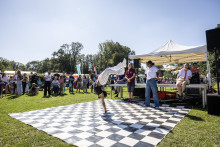How do you feel about these possible measures?
Daniël de Boode (chairman of student association A.S.V. Taste): 'Within Taste we have about thirty committees, from large to small, all with their own charm. Some committees don't take up much time, but others keep students extremely busy. Take acquisition, for example, in which students maintain contact and organize events with companies. In this way, they prepare themselves for their further careers. All of that is now coming under pressure and I fear that the value of the student is deteriorating. Without activism, every student will soon have exactly the same CV, and that's a shame.'
Maartje Vredenbregt (chairwoman of hockey club DHC Drienerlo): 'It's a great pity. We discussed the news about the long-term student fine and the activism grants with the board and then you notice that there is frustration. I don't understand the government's plans. It seems that they want to give the study more priority and they can, but I doubt this is the way. After all, committing to something besides your studies is very rewarding for you as a student.'
Niels Winkelman (chairman of study association W.S.G. Isaac Newton): 'We're worried and we don't understand it. The activism grants are a small part of the UT budget. The rich student life is so important and keeps the UT running. As Isaac Newton, we organize fun things for our members, but we also play an important role in education and in contact with companies. If no one wants to be on a board or committee anymore – look at the Kick-In – then the UT can organise everything itself.'
'We're already noticing that students are starting to have more doubts'
If we assume the darkest scenario will unfold: what would that mean for the association?
De Boode: 'I'd rather not think about that too much. In the best-case scenario, we will find a subsidy elsewhere and with a higher contribution we will ensure that we can at least find a board. In the worst-case scenario, we don't find enough people to keep the association going. A part-time board is not an option. We are just recovering from the corona period and now another blow is imminent.'
Vredenbregt: ‘Our relative advantage is that we work with a part-time board, for associations with full-time boards, such a scenario seems to turn out to be even more troublesome. We are already noticing that students are starting to have more doubts. 'Do I still want to do a board year and fully commit myself to an association?' Activism was already under pressure due to the consequences of corona, and this certainly doesn't help.'
Winkelman: 'Then we have to look at a different structure for the association. For example, by switching to a part-time board, but that is not our preference. In September, we will start with the succession of our board. We are already having some discussions about that, but we notice uncertainty. Students are more reluctant, especially because of the possible return of the long-term study fine. They think paying thousands of euros for a board year is far too expensive, and I understand that.'
Nothing is final yet, but how are you trying to deal with this situation?
De Boode: 'That's difficult to say, because these issues are new. We rely on the self-regulation within Taste. We have numerous clubs in which our members help each other and the rest is mainly about seeing how the issues develop.'
Vredenbregt: 'We'll have to wait and see how everything turns out, but we try to think along with the members and aspiring board members and, above all, to be honest. This is the situation and we have to deal with it.'
Winkelman: 'For now, we'll just have to wait and see. We can only hope that things are not so bad or that things are reversed. That's what we tell our members, even though we understand their concerns and doubts. The fact is that activism is under pressure. Our board has five members, whereas normally there are seven.'








